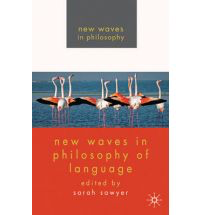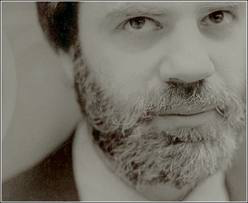A natural kind externalist

Sarah Sawyerinterviewed by Richard Marshall.
Sarah Sawyer has a cool vibe going on in the philosophy of language and digs the superlogicalidocious Gottleib Frege. She’s laying down some mellow phat about consciousness and doesn’t think minds are brains. She edited the book New Waves in Philosophy of Languageand is generally a most groovacious philosopher.
3:AM: What got you into philosophy? Were you always a philosophical type even when a little girl? What’s the appeal of the philosophical life? Do you have philosophical heroes?
SS:I came across philosophy by chance. I went to St Andrews as an undergraduate to study French and German, but had to choose a third subject for my first year. An academic advisor suggested I take Logic and Metaphysics, which I’d never heard of, and I was hooked from the first lecture. I dropped German at the end of the first year; I dropped French at the end of the second; I have never been able to drop philosophy. From a very early age I was interested in the structure of language, in reasoning and in logical inference, and those interests found a direction in philosophy that went beyond anything that the study of particular languages could offer. I was lucky to have been introduced to philosophy, and I’m conscious of how privileged I am to be living life as a philosopher. The primary appeal is having time to think – in my case specifically about the nature of language, thought and knowledge. I don’t generally believe in having heroes, but if pushed I’d have to say Gottlob Frege, father of analytic philosophy, founder of modern logic, rationalist.

3:AM:You’ve defended the compatibilism of two positions in the philosophy of mind that are often considered incompatible. On the one hand there’s a view that’s labeled ‘semantic externalism’, and on the other a view labeled ‘privileged access’. It’s important that we get the significance of this thesis before we get into the details. So could you first say what the two positions are and where they come from?
SS:Let’s start with a simple example. One thing I believe is that copper is a metal. My capacity to believe this clearly depends on my having the concept copper– if I didn’t have the concept copper, then I couldn’t have any thoughts involving the concept. But what does my possession of the concept copperdepend on? This is where externalism and internalism disagree.

According to externalism, relations between a thinker and her external environment play an essential role in determining which concepts she has. The fact that I have the concept copper, for example, depends in part, but essentially, on the fact that I have been related in the right kind of way to copper itself (I have read about it, people have talked to me about it, I’ve seen things made from it, and so on). And if there had been no copper around anywhere, then, according to the externalist, I couldn’t have possessed the concept copper. After all, how could I have acquired it? The externalist thinks of concepts as public rather than private. You and I both have the concept copper, and both believe that copper is a metal, but we may have somewhat different understandings of what copper is – we may have different beliefs about how well it conducts electricity, or how malleable it is, and so on, but it’s still copper we’re thinking about because of our causal connections to it.
According to internalism, in contrast, which concepts a thinker has depends on her intrinsic physical constitution alone – on her brain states, say. According to internalism, then, I could still have possessed the concept coppereven if there hadn’t been any around, so long as my brain was in the right kind of state. As a result, the internalist thinks that people will only express the same concept by the word ‘copper’ if they have exactly the same surrounding beliefs. I think it’s clear that people have slightly different surrounding beliefs about most things most of the time, but I don’t think that means we can’t all think about the same things. Externalism explains how this is possible.
The second thesis, the thesis of privileged access, is one that both externalists and internalists typically accept, and is based on the idea that there’s a difference between the way in which you know what someone else is thinking and the way in which you know what you’re thinking yourself. If you want to know what I think, for instance, you’ll need to take my behaviour (verbal and non-verbal) as evidence. You’ll need to listen to what I say and see what I do. But you don’t generally need to do this in your own case. Your access to your own mind is privileged in that you’re the only one who has access to what you think that’s not based on behavioural evidence.
3:AM:To someone outside of philosophy what would you say to convince them that this is of great importance?
SS:In short, if externalism is true, an individual’s mental states (her beliefs, desires, fears, hopes, imaginings, and so on) are not determined entirely by her internal, physical states (her brain states, for instance). Rather, they are determined by her internal, physical states together with her relations to an external environment. But if mental states are not determined entirely by brain states, then the mind cannot be identical to the brain. This goes against a common view according to which the mind is, in fact, just the brain. If externalism is true, then minds are not just brains. However, we do need to be careful not to fall into the common underlying error of thinking that there are only two available options: either a mind is an immaterial thing essentially independent of a physical body, or a mind is just a brain. Externalism sits between these two positions, and a number of important insights follow from it.
First, two individuals can have the same neurophysiological properties and yet have different mental properties in virtue of being embedded in different environments. And second, as a result, the kinds and explanations of psychology are not determined by those of neurophysiology. Basically, externalism is important because it tells us about the nature of the mind and our capacity to think about the world, but it is also important because it tells us that the relation between psychology and neurophysiology is not straightforward. I don’t think mental kinds are special in this regard. I think there are lots of sciences that are concerned with real kinds that are not determined by the kinds of any lower-level science, and that these sciences provide genuine explanations that could not be provided by any lower-level science. Psychology just happens to be one of those sciences. For example, astronomy, biology, geology, mineralogy, and, of course, the entire range of social sciences, concern kinds that depend on, but are not determined by the kinds of any lower-level science. And the question of whether externalism is compatible with privileged access is important simply because the externalist position comes under pressure if it can’t accommodate the phenomenon of privileged access.
3:AM:So how do you propose to reconcile what seems to be the irreconcilable?
SS:Externalism and privileged access seem to be incompatible because externalism maintains that the concepts we have depend on our relations to a particular environment, while privileged access claims that we can know what concepts we have without finding out about our particular environment. The key is to realise that just because environmental relations determine our concepts, that doesn’t mean we need to know about those environmental relations in order to know which concepts we have.
To take an analogy, I can know that there’s a ladybird on my window sill without knowing what it is that makes something a ladybird (its genetic structure and historical links to other ladybirds, say). Similarly, I can know that I think that copper is a metal without knowing what it is that makes a thought the thought that copper is a metal (causal relations to copper, say). But there is a second, more puzzling question that arises here. If I can know without empirical investigation that I have the concept copper, and I can know without empirical investigation (by philosophical reflection) that I could only have that concept if my environment contained copper, then it looks as if I can come to know without empirical investigation that my environment contains copper.
3:AM:You relate your thesis to the question of skepticism of the external world don’t you? How does your position help clarify issues in this?
SS:It looks as if externalism might provide an argument against scepticism about the external world because according to externalism you couldn’t think about anything at all unless your thoughts were grounded in real relations to a world that is broadly speaking as you take it to be. However, it’s not quite as straightforward as that. Obviously not all of our concepts represent real things. However, some of the concepts that don’t represent real things - unicorn, goblin, phoenix, for example – are plausibly derived from sets of concepts that do represent real things; and others - phlogiston, bodily humors, luminiferous aether, for example– are theoretical concepts from failed scientific theories, introduced to explain phenomena that we can observe. As such, these are also connected to sets of concepts that represent real things.
I think all of our concepts are ultimately related to the world, either directly or indirectly, but it’s a difficult empirical question which concepts are directly related to it by representing real things, and it’s a further, difficult empirical question what the real things that we represent are like. So, although relations to an external world might be secure, it’s not much of a victory over the sceptic. The funny thing about scepticism is that philosophers would generally like to be able to refute the sceptic, but whenever a supposed refutation of scepticism is offered, they automatically think there must be something wrong with it.
3:AM:Related (perhaps) is how you link a person’s mental states with their social states. This is the position of ‘social externalism’. Can you say something about this. I guess what’s interesting is what the position contrasts with, such as a more narrowly individualistic response to the social externalist position.
SS:Natural kind externalism says that relations between an individual and her natural environment in part determine which concepts she can have. The example I gave earlier involved the concept copper. Copper is a so-called ‘natural kind’, a kind that science aims to discover, and perhaps, although this is a difficult issue, a kind that exists independently of whether anyone thinks about it or comes across instances of it. Other terms in our language are more socially dependent: ‘contract’, ‘interview’, ‘game’, ‘spouse’, ‘poetry’, ‘computer’ and so on. Social externalism is the thesis that relations between an individual and members of her linguistic community can make a difference to which concepts she possesses and hence to which thoughts she is capable of thinking.
The fact that concepts are public is crucial here. We might disagree, or be unsure about whether contracts have to be written, whether an interview has to involve a meeting, and so on, but still nonetheless be thinking about contracts and interviews. But if our individual conceptions of these things differ, then what makes it the case that we all have the same concept and hence think about the same things? According to social externalism, very roughly, our individual conceptions are right to the extent that they match the individual conceptions of the most competent amongst us, and it is the individual conceptions of the most competent in our society that determine what concepts we have.
3:AM:Has any of the recent work of the experimental philosophyof the likes of Josh Knobeand Eric Schwitzgebelbeen helpful in supporting your own thoughts about the limits of introspection? More generally, are you sympathetic to this branch of philosophical enquiry?
SS: I haven’t drawn on either the results or the methods of experimental philosophy. I tend to think that while some insights may emerge from experimental philosophy, there will still be fundamentally philosophical questions that are left unanswered by it. Philosophy and empirical science are related, and each should inform the other, but I think it’s a mistake to think that empirical science can solve a philosophical question, because a proposed solution from empirical science will always presuppose a particular philosophical position.
3:AM:I guess related to this is the question as to where you position yourself in terms of whether you are a naturalist philosopher?
SS:I am most definitely a naturalist philosopher. What makes me a naturalist is the fact that I think once the distribution of physical particles and the laws of physics are set, there is no room for other facts to vary, so two worlds could not be exactly alike in all physical respects across time, but one of them have moons, hearts, continents, and creatures with minds, but the other not. However, I think it’s important to distinguish naturalism from physicalism. I am not a physicalist. Physicalism is the stronger thesis that every (non-abstract) individual thing is a physical thing in the sense that its physical constitution determines all its other properties. As an externalist, I think that physical constitution alone cannot determine what properties a thing has, and hence cannot determine what kind of thing it is. Whether something is a moon depends not just on its physical composition but on whether it’s orbiting a planet; and whether I believe that copper is a metal depends not just on my physical composition but on whether I’m causally related to copper. Many philosophers have thought you have to be an internalist in order to be a naturalist. You don’t. You just have to be an internalist to be a physicalist. The common error I mentioned earlier of thinking that we must choose between a mind as an immaterial thing and a mind as a brain effectively equates naturalism with physicalism. Once we free ourselves from this equation, we can see how a mind could be natural, but not just a brain.

3:AM:You edited and contributed to ‘New Waves in Philosophy of Language.’ Can you say what is distinctive about the current state of this particular branch of philosophy? Although it is no longer the only game in town, as it seemed to be in the hay-day of Wittgenstein and Austin in some quarters, it is still very important isn’t it? Can you say how you think it’s developing?
SS:You’re right that philosophy of language isn’t the only game in town, but philosophical questions in the analytic tradition are still approached through an understanding of language. It was a revolutionary insight that language could be a guide to metaphysics, and I can’t see that ever changing.
3:AM:In that volume and elsewhere you ask what a proper name is, and engage with an idea of Tyler Burge’s. It’s sometimes a criticism of the Anglo-American philosophers that they aren’t engaged with anything important to us all, but it’s often because we don’t understand the wider significance of what might initially seem too narrow for general interest. So can you first say why this is an important issue for those who might wonder whether it is.
SS:The question of what a proper name is can seem rather abstract, but thinking philosophically about the nature of language (about proper names, predicates, sentences, etc.) is inextricably connected with Frege’s invention of modern logic, which in turn enabled computer programming languages to be developed. So, from thought about language came computational systems. However, I think it’s important not to think knowledge is only significant if it yields some other benefit. I think a correct understanding of the world is intrinsically valuable, and a correct understanding of the world requires a correct understanding of language, and hence of proper names.
3AM:So what is a proper name and how does it solve Kripke’spuzzle about belief?

SS:Philosophers generally distinguish proper names from predicates. Proper names (expressions like ‘Sarah’, ‘London’, and ‘Saturn’) allow us to talk about individual things, while predicates (expressions like ‘… is a philosopher’, ‘… is a city’, and ‘… is a planet’) allow us to talk about properties shared by a number of different individual things, and hence to talk about groups of individuals. I reject the standard distinction and think that names are in fact predicates. This is because I think that names function in the same way as predicates.
Take the following pairs of sentences: (1a) ‘There are two Sarahs who live in my street’ and (1b) ‘There are two philosophers who live in my street’; (2a) ‘Some Joys are not particularly joyful’ and (2b) ‘Some cities are not particularly interesting’; (3a) ‘Not every Michael is a Mike’, and (3b) ‘Not every planet is a gas planet’. In each pair, the first sentence contains a name and the second contains a predicate, but the sentences are identical in terms of their structure. And if we do want to talk about a particular individual, then we can do so by using a predicate together with a demonstrative expression. So, just as I might say ‘This city is particularly interesting’ as I walk around London, thereby distinguishing it from less interesting cities, I might say ‘This Joy is particularly joyful’ as I describe a friend, thereby distinguishing her from less joyful Joys we may know. So, a proper name is a predicate.
But how does this solve Kripke’s puzzle about belief? Well, here’s an example of the puzzle. Suppose Fred knows a Rosie who writes poetry and a Rosie from work, but doesn’t realise they’re one and the same person. Then Fred might think that Rosie’s a poet, because he’s read a collection of her published poems, but also think that Rosie’s not a poet, because he knows her from the office and her emails are always really poorly constructed. This means Fred has beliefs that are straightforwardly inconsistent - he believes both that Rosie is a poet and that she’s not a poet. There’s nothing odd about the situation. What’s difficult is to give an explanation of what’s going on that doesn’t make Fred look irrational. And the claim that proper names are predicates can do this by emphasising the fact that a name can only be used as a name of a particular individual given a contextual relation between the speaker and the individual named. There’s nothing irrational or inconsistent about believing both that Rosie is a poet and that Rosie is not a poet if the real form of the belief is that that Rosie is a poet and that that Rosie is not a poet. This is because it’s not always obvious when contextual relations relate you to the same object.
3:AM: I notice that in your introduction to that volume you use the labels ‘analytic’ and ‘continental’. What do you think about the arguments that are gaining traction in many quarters that this is no longer a distinction marking any principled distinction?
SS:I think the difference between analytic and continental philosophy is hard to characterise, and not clear-cut. But I don’t think that means there isn’t a distinction. I work at the University of Sussex, which has one of the few departments in the country with a significant number of people on both sides of the divide, as well as a few people with an understanding of both traditions. And yet there are still marked differences in terms of the kinds of questions that motivate us and the kinds of answers we think are satisfactory.
3:AM:Another big issue in philosophy at the moment is the place of women in the academy. Ruth Barcandied recently and she was a big advocate of fighting for more women. You are a top language philosopher but looking at recent surveys and data women are rarer in philosophy departments than in other departments where one might expect a similar ratio of the genders. Why do you think philosophy has found it harder to respond to women than nearly any other area? Have you been aware of the difficulty? Is there anything that might help?
SS:It’s certainly noticeable that philosophy - particularly analytic philosophy – is a male-dominated discipline. I did have the opportunity recently to have an all-female seminar and an all-male seminar for the same undergraduate course and I was struck by the difference between them. I would say that the distribution of philosophical abilities across the two seminars was about the same, and there were some of the very best undergraduates on both groups, but there were two striking differences. First, the women almost invariably prefaced their comments with expressions such as ‘I might have got this wrong, but ...’, or ‘I’ve probably misunderstood this, but ...’, whereas the men almost never did. Second, the women were generally much more reticent in asking questions and trying out ideas. I’m not sure why this is, exactly. However, a recent studyby the Society for Women in Philosophyhas drawn attention to the imbalance in the discipline in a number of ways and at different levels. Hopefully the fact that this has been circulated to philosophers in Britain will help to raise awareness of the issue, and hence go some way towards redressing the balance.
3:AM: Looking forward, what do you think are the big challenges in your field of work in the next few years?
SS: That’s a really difficult question to answer. Perhaps the biggest challenge will be to stave off the common thought that the only model for academic inquiry is the scientific model. This thought has a number of detrimental implications concerning, for instance, the criteria against which the significance of research is judged.
3:AM:Are there books or films outside of the philosophical literature that have been enlightening for your work? Are you a sci-fi fan?
SS:Well, I work on philosophical issues to do with our understanding of fiction, the nature of fictional characters and properties, and so on, but these are general issues that don’t depend on knowledge of any particular works of fiction. I can’t say that I’ve found specific books or films enlightening for my work. Fiction can be an excellent way of getting people to think philosophically about the world and their place in it, but the philosophical questions are there independently.
3:AM:And finally for the sassy crowd here at 3am, are there five books that you think would give us further insights into what you consider to be the important questions in contemporary philosophy even if we weren’t trained?
SS:I’d say try one of the following: Simon Blackburn, Think: a compelling introduction to philosophy; Simon Blackburn, Being Good: a short introduction to ethics; Thomas Nagel, What Does it All Mean? A Very Short Introduction to Philosophy; Bertrand Russell, The Problems of Philosophy. And if you want to delve a little deeper, try searching through the online Stanford Encyclopedia of Philosophy, edited and written by contemporary philosophers. It’s difficult, but an excellent resource.
ABOUT THE INTERVIEWER
Richard Marshallis biding his time.